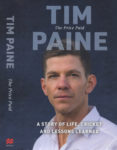No products in the cart.

KEN PIESSE reviews Tim Paine’s autobiography The Price Paid
So angry and broken was Tim Paine after exiting the Australian Test captaincy in disgrace, that he pondered taking his own life.
His Australian and Tasmanian kitbags were binned: pads, bats, gloves, helmets, everything.
 ‘I was an idiot,’ he said. ‘I knew I’d done something really dumb. It was unspeakably, unforgivingly stupid. I was a dickhead.’
‘I was an idiot,’ he said. ‘I knew I’d done something really dumb. It was unspeakably, unforgivingly stupid. I was a dickhead.’
His life soured almost irretrievably when an exchange of sexually explicit texts with a former colleague at Cricket Tasmania became public.
‘One day you are living the dream with a capital D. The next you’re sitting at home with nothing but shame. Then there’s despair,’ he writes in his autobiography The Price Paid.
‘Waves of anxiety and anguish crashed over me the whole time… I was in this awful vacuum…maybe it would be easier for people if I wasn’t there. I felt so ashamed about what I was putting (wife) Bonnie, my family and other people through that I thought would be better.’
Not unsurprisingly, Paine doesn’t outline exactly what happened, or detail the involvement of his brother-in-law, Shannon Tubb in the scandal. But most know it involved a series of flirtatious texts, including a texted picture of his penis.
He insists the texts were consensual, but for all four years of his surprise cricketing resurrection, he lived knowing the scandal would break… sometime.
It was an intolerable pressure which soured and sent his marriage to the rocks.
‘The nightmare that had haunted me in the background since the complaint in 2018 became a reality when I got a call from my manager James Henderson in November 2021 saying that a newspaper (Melbourne’s Herald Sun ) was onto the story. ‘I figured this was going to be bad, but I had no idea how bad it was.’
Cricket Australia withdrew their support – ‘they threw me out on the streets… they were driven by the need to protect their image’ – and he resigned the captaincy, becoming a loner and withdrawing from family, friends and even his favourite cafes. He refused to turn on his car radio all summer, so he didn’t have to hear his own name. ‘I descended into a pit,’ he said. ‘I was a mess.’
How a popular, cheeky, apparent cleanskin from unfashionable Lauderdale had become captain of Australia is a remarkable story in itself.
He’d agreed to take a desk job with Kookaburra Sport in Melbourne, believing at 32 that too many other wicketkeepers were ahead of him, including Matthew Wade in his own backyard of Hobart. He rang his mate Ricky Ponting and joked about the price of real estate in Ricky’s neighbourhood, Brighton, telling him he was quitting cricket and moving to the mainland.
Within days, thanks to Ponting’s caring and considerable contact base, Paine was offered a fresh two-year contract by Cricket Tasmania, the first steppingstone in his shock Test recall for the 2017-18 Ashes… his first Tests in seven years. His elation knew no bounds. And on match eve, in Brisbane, the damning text sent.
Remarkably, just six months later, after the fall-out from Cape Town – and the banning of team leaders Steve Smith and David Warner – he was handed the No.1 sporting job in the country, the Australian Test captaincy.
‘I’d been placed in charge of a team whose best players were suspended and whose public standing was in the gutter.’
Paine’s genial management helped to create a new sweet spot for Australian cricket, engendering fresh credibility and a formidable new edge which carried the team into the 2023 World Championship Test final.
He’d stood down reluctantly, with unfinished business, not wishing the dream to end.
‘I was still at the top of my game with my gloves on. My batting was proving to be a bonus. I was fit. I was performing and I had nothing else to do, so this party could go on forever.’
He writes compellingly about the lack of support for sacked ex-coach Justin Langer and says the year-long suspensions for Smith and Warner were totally over blown as ball tampering had been cricket’s darkest secret for years.
‘It became apparent that this (the backlash) wasn’t just about using sandpaper on the ball, it was about the way we played cricket, the way the public perceived us. It wasn’t so much a wake-up call as being woken with a bucket of cold water and dragged onto the street by an angry mob.’
He said the reporting of ‘Sandpapergate’ was vicious and so many good people cast aside, like coach Darren Lehmann, who had no knowledge of the affair until it was too late.
‘People should know that in Cape Town you are a team divided,’ Paine writes. ‘The change room is divided by the shower and toilet block and players have to split up either side for the duration of the Test. The coaches are in another room. Something can happen in one room and the people in the other two would have no idea.’
Minutes after a break, Cameron Bancroft was spied with sandpaper in his hand and hurriedly concealing it down the front of his trousers after the crowd began booing. ‘It was on the big screen and it looked terrible,’ said Paine. ‘A sense of dread come over us all.’
Rather than just three being punished, he believes the fallout would not have been as stark had we ‘owned it as a team’.
‘Ball tampering was not a big deal for cricketers, but this incident took on a life of its own,’ he said.
Paine’s story sees a precocious 16-year-old sign a $10,000 contract as Tasmania’s youngest ever rookie and tracks his rise into the Test team, alongside Smith at Lord’s in 2010.
A litany of finger operations so slowed his career that he initially agreed to a move to mainland Melbourne, before Ponting’s timely intervention.
Mainstream publishers may have bypassed his story had it not been for the sexting scandal and his ignominious exit from the Test captaincy. But it is a tale well told – even if the whole truth and nothing but the truth has been withheld.
*COPIES ARE available from Ken at cricketbooks.com.au
Never miss a sale or new release. Subscribe to cricketbooks.com.au

Cricketbooks.com.au is Australia’s number 1 website and online store for cricket publications and memorabilia. Coordinated by Ken Piesse – Author, Commentator, Public Speaker, and Publisher – cricket books has Australia’s largest range of both new releases and classic collectibles, cigarette cards, rare photographs, and much more.
PO Box 868
Mount Eliza, Victoria 3930, Australia
Mob: 0419 549 458
Tel: (03) 9787-8023
Email: kenpiesse@ozemail.com.au